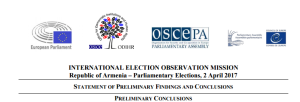International Election Observation Mission. Statement of Preliminary Findings and Conclusions
16:59, April 10, 2017 | News, Other news | Electoral Rights The 2 April parliamentary elections were well administered and fundamental freedoms were generally respected. Despite welcomed reforms of the legal framework and the introduction of new technologies to reduce the incidents of electoral irregularities, the elections were tainted by credible information about vote-buying, and pressure on civil servants and employees of private companies. This contributed to an overall lack of public confidence and trust in the elections. Election day was generally calm and peaceful but marked by organizational problems and undue interference in the process, mostly by party representatives.
The 2 April parliamentary elections were well administered and fundamental freedoms were generally respected. Despite welcomed reforms of the legal framework and the introduction of new technologies to reduce the incidents of electoral irregularities, the elections were tainted by credible information about vote-buying, and pressure on civil servants and employees of private companies. This contributed to an overall lack of public confidence and trust in the elections. Election day was generally calm and peaceful but marked by organizational problems and undue interference in the process, mostly by party representatives.
The legal framework for elections is comprehensive but complex. The new Electoral Code was adopted less than one year before elections in a reform process that was characterized as inclusive and seen by most IEOM interlocutors as a step forward in building overall confidence in the electoral process. A number of previous OSCE/ODIHR and Council of Europe’s Venice Commission recommendations were addressed, although some areas merit further attention. Some IEOM interlocutors criticized the complexity of the new electoral system. Civil society organizations did not endorse the final text because of restrictions on citizen observers.
The Central Election Commission (CEC) met all legal deadlines and conducted its work in a transparent manner while operating collegially and efficiently. The CEC approved rules of procedure for Territorial Election Commissions (TEC), Precinct Election Commissions (PEC) and guidelines for observers and proxies. They also issued a number of clarifications of the Electoral Code mostly at the request of NGOs and proactively reacted to campaign violations. Decisions and agendas were published on the CEC website in a timely manner. However, the CEC did not pursue complaints rigorously.
For more details see HERE
